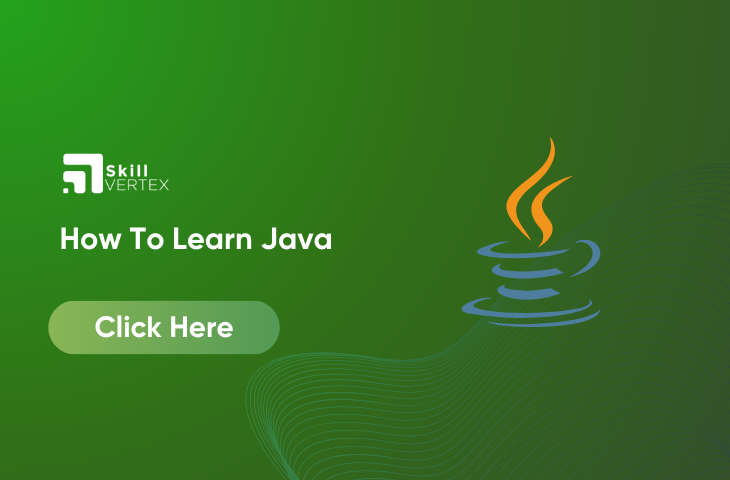Table of Contents
How To Learn Java
Learning Java from the very beginning can be both exciting and empowering. Java is a versatile and widely used programming language that opens up many opportunities. This guide is here to help beginners like you start learning Java with confidence. We’ll provide a step-by-step approach, essential resources, and practical tips to make your Java learning journey enjoyable and successful. So, let’s begin this exciting adventure of learning Java and discover the world of programming possibilities together.
What is Java
Java is an easy and clear language to learn. It’s based on C++, which makes it simpler for C++ programmers. Java removes confusing features like explicit pointers and operator overloading. It manages memory automatically with a garbage collector. Java works on any machine because it compiles programs into a special code called bytecode. This code can run on any computer using the Java Virtual Machine (JVM), making Java highly portable.
Java follows object-oriented programming (OOP) principles, which make programs easier to manage by dividing them into objects. Objects help data flow between functions and allow easy modifications, ensuring reliability in various applications, from Blu-ray players to navigation systems that support multithreading, allowing tasks to happen simultaneously.
This keeps programs responsive, like managing a Graphical User Interface (GUI) and waiting for network input.Java can create applets for web browsers, although this feature has been phased out due to reduced browser support. Unlike some languages, Java doesn’t need a preprocessor or header files for creating applications. Overall, Java’s simplicity, platform independence, object-oriented approach, robustness, and multitasking support make it a widely popular and successful language.
Benefits Of Learning Java
- Java’s Popularity and High Salary
- Java is Easy to Learn
- Java has a Large Community
- Java has an Abundant API
- Java has Multiple Open Source Libraries
- Java has Powerful Development Tools
- Java is Free of Cost
- Java is Platform Independent
- Java has Great Documentation Support
- Java is Versatile
Requirements Of Learning Java
Before diving into programming with Java, it’s essential to have some foundational knowledge:
- Basic Computer Usage: You should be familiar with using a computer and know how to perform common tasks like opening applications, navigating the file system, and managing files.
- Command Line: Understanding how to use a command-line shell is helpful. This knowledge allows you to interact with the computer’s operating system using text commands.
- Introduction to Programming: If you’re new to programming in general, consider starting with an introduction to programming course or resource. This will teach you fundamental programming concepts that apply to Java and other languages.
- C++ or OOP Knowledge: If you already have experience with programming, especially in languages like C++ or any other object-oriented language, transitioning to Java should be relatively straightforward. Java shares many concepts with these languages.
By having these basics in place, you’ll be better prepared to learn Java effectively and build a strong foundation in programming.
9 Different Ways To Learn Java
1. Online Java Tutorials
Online Java tutorials are freely available on various websites. These tutorials typically start with the basics and progress to more advanced topics. They often include code examples and exercises to practice what you’ve learned.
2. Java Books
Java programming books provide in-depth explanations and examples. They offer structured learning paths and can be valuable for those who prefer a structured and comprehensive approach to learning.
3. Online Java Courses
Online courses on platforms like Coursera, edX, Udemy, and Pluralsight provide structured learning experiences. These courses are often taught by experienced instructors and may include video lectures, quizzes, and assignments.
4. Interactive Coding Platforms
Websites like HackerRank, LeetCode, and Exercism offer Java coding challenges and exercises. These platforms provide hands-on experience and help improve your problem-solving skills.
5. YouTube Video Tutorials:
YouTube channels dedicated to Java programming offer video tutorials for visual learners. These tutorials cover various Java topics, making them a useful supplement to other learning materials.
6. Local Java User Groups
Joining a local Java user group or attending meetups allows you to connect with fellow Java enthusiasts. These gatherings often feature presentations, workshops, and discussions on Java-related topics.
7. Java IDEs and Practice Projects
Installing a Java Integrated Development Environment (IDE) like Eclipse or IntelliJ IDEA allows you to write, run, and debug Java code easily. You can work on practice projects to apply your knowledge and gain hands-on experience.
8. Java Documentation and Official Resources
The official Java documentation, available on the Oracle website, is a valuable resource for learning Java. It provides comprehensive information about the language, libraries, and best practices.
9. Java Courses at Educational Institutions
Choosing the right method or combination of methods depends on your learning style, goals, and resources. Many learners find success by combining multiple approaches to gain a thorough understanding of Java programming. The key is to stay consistent, practice regularly, and seek help or guidance when needed.
FAQ -How To Learn Java For Beginners From Scratch
Q1. Is Java easy to learn for beginners?
Ans. Java is known for its speed and efficiency. It’s also considered easy to learn because many complex processes are automated, reducing the need for in-depth technical knowledge compared to low-level languages.
Q2. Can I directly start learning Java?
Ans. Java is a more advanced programming language compared to C. Importantly, you don’t need prior experience with C or C++ to learn Java. Many successful programmers started with Java as their first language before exploring C or C++.
Q3. Is C++ or Java harder?
Ans. C++ is often considered one of the most challenging programming languages to learn, especially when compared to more popular languages like Python and Java. Its complexity arises from its multi-paradigm nature and advanced syntax.
Hello, I’m Hridhya Manoj. I’m passionate about technology and its ever-evolving landscape. With a deep love for writing and a curious mind, I enjoy translating complex concepts into understandable, engaging content. Let’s explore the world of tech together

